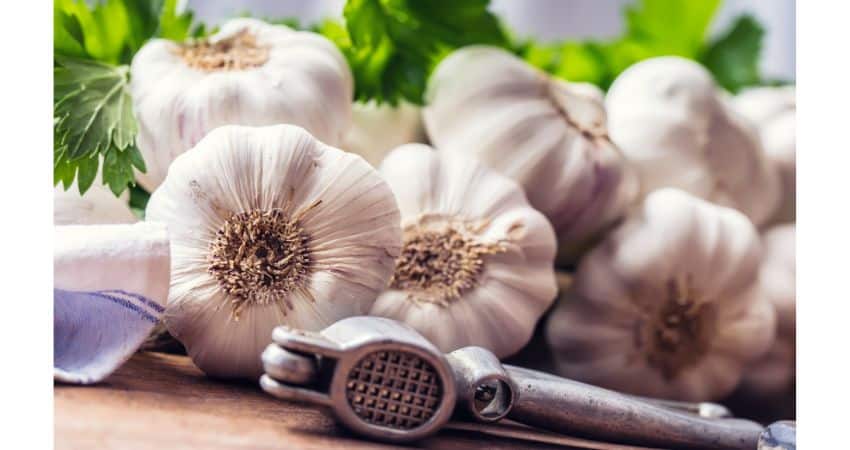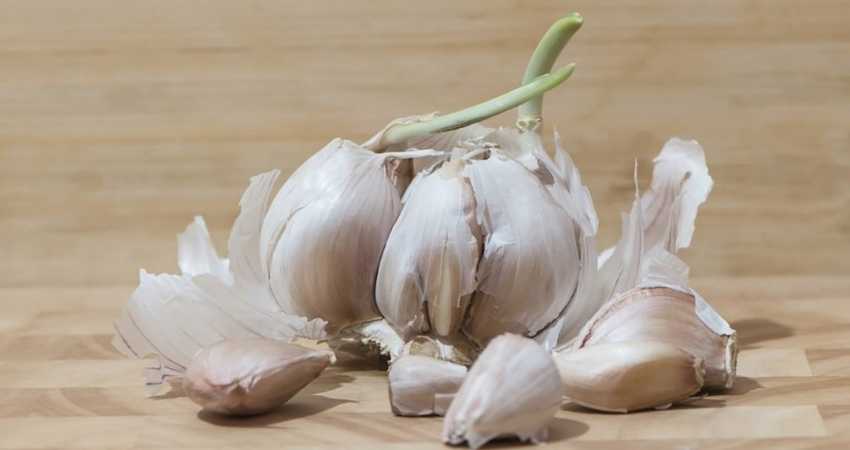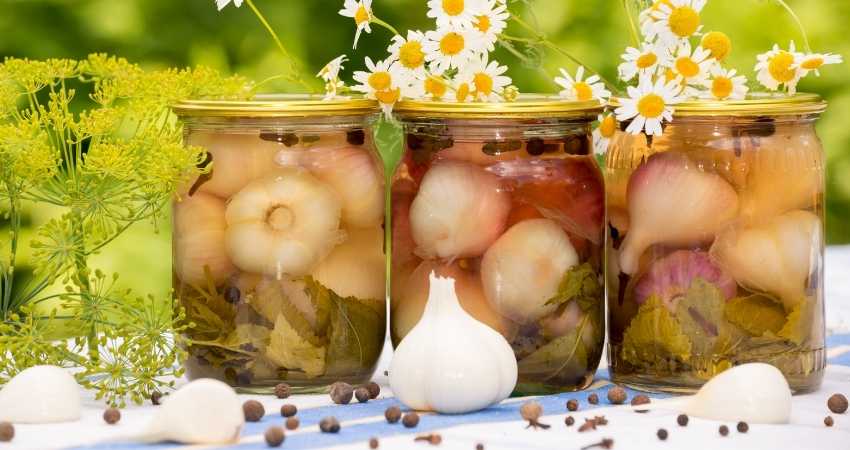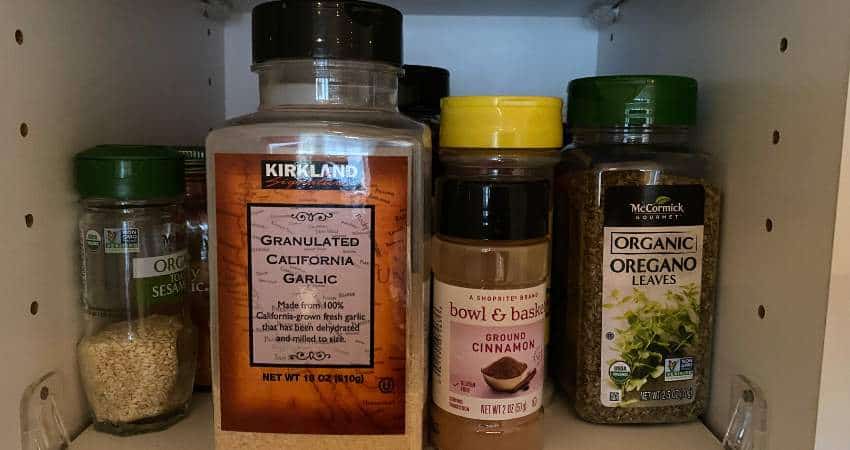This Is The Guide To Store Garlic Properly For Best Results
It’s easy to end up with too much garlic which leaves many people asking, how do you store garlic?
Fresh garlic is best stored unpeeled in a dark, dry, cool, ventilated place like the pantry. For longer-term storage fresh garlic can be frozen and stored in the freezer. Peeled or chopped garlic should be stored in an airtight container and refrigerated. Garlic powder should be stored in an airtight container and in a cool, dry area like the pantry.
Garlic will stay fresh for a long time compared to other ingredients if you keep it in the proper environment and take the right steps. This blog post will dive into those steps so you can extend your garlic’s shelf life as long as possible.
How To Store Fresh Garlic

As a Certified Health Coach many clients ask me about food storage including garlic. Also, I purchase and consume it every week. Therefore, I have researched this topic in the past and present. Let’s examine the storage methods closely.
Fresh garlic cloves come in their own natural storage container, the garlic bulb. The bulb or head of garlic has skin around it that preserves the garlic cloves naturally for a surprisingly long time.
The best way to preserve and store fresh garlic are to leave it unopened. The skin of the garlic bulbs can keep the cloves fresh for up to six months1. This is dependent on the type of garlic and the conditions it’s stored in.
Keep your garlic bulbs unopened and unpeeled if you intend keeping them unused for a while.
Garlic is best kept in a dry and dark environment with good air circulation2. This environment prevents the growth of mold and fungus. Mold and fungus are real problems to consider because garlic can be stored for so long.
Can You Store Fresh Garlic in the Fridge?
Do not store fresh garlic in the fridge because the temperature is too low. Fresh, unpeeled garlic should be stored at room temperature or slightly below. In addition, the moisture of the fridge can speed up the sprouting process.
While the fridge is dark and dry, the temperature is too low to store garlic for long periods of time. Garlic prefers cooler temperatures but not as cool as the fridge.
Garlic naturally sprouts in climates with more moisture. Therefore, if it’s stored with more moisture, it will begin to sprout faster, which will change the taste of your garlic.
Garlic that has sprouted is not inedible and will not harm you. It will no longer have the same taste that makes your food so delicious. In fact, it will end up tasting quite bitter and could even ruin your food.

Does Fresh Garlic Freeze Well?
Fresh garlic can be frozen and stored in the freezer. The garlic should be placed into an airtight container or freezer bag. Fresh garlic can be frozen peeled or unpeeled and in cloves or a complete head.
Frozen garlic will stay edible for a very long time, up to one year. Many people say freezing garlic can cause it to lose some of its flavor, crispness and intensity3.
In addition, make sure the container or bag is completely sealed so the odor of the garlic doesn’t spread to the items in the freezer4.
How To Store Peeled Garlic
What if you’ve pealed garlic to be used in a meal and you accidentally prepare more than you need? Now you have much of it left-over, what now?
This situation has happened to everyone who cooks with fresh garlic cloves. Sometimes it is unavoidable and instead of throwing it out let’s discuss, how to store peeled garlic?
Peeled garlic can be stored in the refrigerator and placed into an airtight container for up to two days. In addition, peeled garlic can be frozen. The peeled garlic should be placed into an airtight container or freezer bag.
Opened or chopped garlic degrades quickly, even when kept in the fridge. Luckily, there are other ways to help preserve it and keep it useable for longer. Here are a few methods you can try to store your opened or chopped garlic cloves for longer than just a day or two.
Disclaimer: Some of links in this article are affiliate links which means I may earn a small commission at no extra cost to you. As an Amazon associate I earn from qualifying purchases.
How To Dehydrate Garlic for Storage
If you are an owner of a food dehydrator, then dehydrating your fresh garlic cloves is a great method to prepare them for storage. If you don’t have one, take a quick peek at some affordable ones listed on Amazon by clicking here, food dehydrators.
Garlic does not have a very high moisture content, so it will not take very long to completely dehydrate the cloves or pieces of garlic5.
Follow these steps to dehydrate garlic:
- Separate and peel the cloves.
- Cut each clove lengthwise in half.
- Follow the instructions for your dehydrator or continue.
- Dry the cloves at 140 degrees Fahrenheit for two hours.
- Reduce the heat to 130 degrees Fahrenheit and continue drying until the cloves are brittle. Typically, this step takes another four to six hours.
- Placed the dried garlic into airtight containers and store at room temperature in the cabinet away from light or heat.
- In addition, dried garlic can be placed into the freezer.
Dehydrated garlic can be a tasty ingredient for many dishes, and it can even be ground down to be used for garlic salt or as garlic powder. Either one is a fantastic addition to every spice rack.
How To Dehydrate Garlic Without a Dehydrator
If you don’t have a dehydrator but still want to dry your garlic, it can be done in the oven6. Follow these steps:
- Prepare your garlic to your liking by either mincing it or slicing them.
- Line a baking sheet with parchment paper and arrange the garlic evenly across the sheet.
- Preheat the oven to 170 degrees Fahrenheit.
- Place the baking sheet into the oven for 30 minutes and remove it and let it cool down.
- The garlic is completely dry when it crumbles or snaps easily in your hand.
- If it’s not dry, repeat the heating process and check again.
Can Roasted Garlic be Stored?
Garlic can be roasted as entire bulbs, individual cloves, chopped or processed. Full bulbs will take longer to roast. If you have some extra garlic cloves left over from meal preparations, then roasting the garlic is a good way to keep it good for longer.
After garlic has been roasted, whether in bulbs or individual cloves, it will last for much longer than fresh garlic will when it is kept cold. Store roasted garlic in airtight containers in the fridge or freezer.
Roasted garlic has a different flavor to raw garlic. It can be slightly sweet and milder. Roasted garlic will make a good ingredient for many dishes. You may even add it to the sandwich you were planning on having for lunch tomorrow.
Roasted garlic can be blended into a delicious paste and stored in the fridge for a very long time. You can add other spices and flavors to it and turn it into a delectable spread for crackers or bread.
Roasted garlic can be frozen almost indefinitely and will retain its flavor for months in the freezer.

Storing Garlic in Olive Oil, Vinegar or Wine
Garlic in Olive Oil Warning: Because garlic has a low pH, typically 5.3 to 6.3, it supports the growth and subsequent toxin production of Clostridium botulinum (Botulism). Botulism can result in death and paralysis within days if left untreated. Improper preparation and storing garlic in olive oil may lead to the illness.
Moisture, temperature and lack of oxygen can favor this serious illness. This is why garlic in oil cannot be stored at room temperature. In addition, home canning of garlic can lead to the same illness7.
While these are the best long and short term storage options for garlic, there are other methods of storing garlic to keep it fresher for longer than just leaving it to shrivel in the pantry:
- Stored in wine – garlic can be stored in dry red or white wine and kept in the fridge for up to four months.
- Stored in vinegar – similar to wine, vinegar is a safe way to store garlic. Store it in the fridge, and it will keep for approximately four months.
- Stored in olive oil – be careful with this storage method. Garlic that has been stored in oil at room temperature can make you sick. If the garlic is fresh when it is placed in the oil, be sure to store it in the refrigerator and use it within a few days. Garlic in oil can be frozen and kept in the freezer for several months. If the garlic is fully dried or dehydrated, it can be stored for much longer. Always keep garlic that is stored in oil in the fridge or freezer and date the packaging. I recommend playing it on the safer side and don’t store garlic in oil at all.
- Pickled with spices – pickled garlic can enhance the flavor of the garlic. Store the garlic in white vinegar and add your own herbs and spices for a unique taste experience.
How to Store Garlic Powder

Garlic powder already comes in its own bottle when you purchase it. This doesn’t mean the storage for it is complete. There are certain conditions that must be followed to make sure it stays fresh as long as possible and doesn’t get hard.
Garlic powder should be stored in an airtight jar or container. If you purchased one at the store, their container would do just fine. If you made your own powder, use an old spice jar with a proper seal ((Iowa State University: Herbs and Spices – part ll)).
Keeping old spice jars around can come in handy for many uses besides spices. They sell many nice ones on Amazon at a decent price. Check them out right here, spice jars. Some of them even come with labels which are a nice feature.
The garlic powder should be stored in a cool, dry area away from the heat. A closed cabinet is the perfect place for this. Some mistakes people make are keeping their spice jars or racks near the oven or in direct sunlight ((Ohio State University Extension: Pantry Food Storage)).
Garlic powder has a shelf life of about two to three years ((Institute of Agriculture and Natural Resources: Food Storage)). For this reason, don’t buy them in bulk unless you cook every day for a big family and use a lot of the powder. If you’re looking to save some money, buy the larger size bottle instead of multiple smaller bottles on sale.
If your garlic powder is getting hard, you’ll want to check out my blog post on the topic, How To Keep Garlic Powder From Getting Hard.
Pressure Canning Garlic For Storage
The FDA doesn’t recommend canning garlic. For this reason there is no scientifically tested process for pressure canning garlic. Some websites claim it’s okay to do it anyway. While they may be right, I couldn’t recommend something the FDA says not to do.
In addition, when garlic is heated in this manner, it loses most of its flavor. There are other safe methods for storing garlic that retain most of its flavor. If you’re interested in looking at some pressure canners and jars for other uses, check some out on Amazon, pressure canners.
Despite FDA warnings, some people are still storing their garlic in olive oil. There are numerous documented occurrences. In 1999, a botulism outbreak in Florida was linked to homemade garlic-infused oil.
Another one stemmed from a restaurant where 37 people were sickened after eating a garlic-in-oil preparation. It’s not just garlic, it can occur with other vegetables so be careful and do your research8.
If you have any questions to ask me about this article don’t hesitate to comment below or email us. You can find an email on our contact page.
Read Next – More Food Storage and Garlic Articles
How to Mince Garlic Without a Mincer
5 Tips on Storing Garlic Bread
Can You Store Cinnamon in the Fridge?
Ceylon Vs Cassia Cinnamon: Which is Better?
- North Dakota University: From Garden to Table: Garlic! [↩]
- University Of Massachusetts Amherst: Garlic Harvest, Curing, and Storage [↩]
- Michigan State University: Michigan Fresh: Using, Storing, and Preserving Garlic [↩]
- Oregon State University: Preserving Foods: Garlic [↩]
- Michigan State University: Dehydrating onions and garlic [↩]
- Clemson Cooperative Extension: Preserving Onions and Garlic [↩]
- University of California: Garlic: Safe Methods to store, Preserve, and Enjoy [↩]
- International Association for Food Protection: Current Food Safety Issues of Home-prepared Vegetables and Herbs Stored in Oil [↩]
